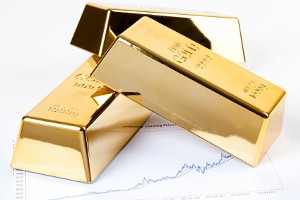Should gold be part of my portfolio?
[Editor's note: This is Part I of a two-part series on whether it makes sense to include gold in your portfolio. Part II is “Why gold should be part of your investment portfolio.”]
Humans have valued gold for several millennia, and that will likely continue. It is understandable, then, that a human such as yourself might consider trading some green for gold. I say, “Don't bother,” and here's why….
1. Gold isn't a consistently good investment
The wisdom of an investment decision depends on when you buy and when you sell. This makes all kinds of things — from dot-com stocks to Beanie Babies — extraordinarily good investments … as long as you sell before prices plummet.
Gold is no different, as current owners know; it was a fabulous investment through most of the 2000s, but has lost a third of its value since 2011. This isn't unusual. Check out the returns on an ounce of gold over the past 40 years, based on data from the Federal Reserve Bank of St. Louis. The rolling returns measure performance over various holding periods, each starting a year later. For example, five-year rolling returns are the average annual price changes in gold starting with 1975-1979, then 1976-1980, then 1977-1981, and so on. The “% Positive” is the percentage of times that gold was at a higher price over the indicated period.
| Gold , 1975-2014 | 1-yr Returns | Rolling 3-yr. Returns | Rolling 5-yr. Returns | 10-yr. Rolling Returns |
| Best | 146.1% | 60.1% | 33.4% | 11.4% |
| Worst | -32.6% | -13.4% | -11.3% | -5.1% |
| % Positive | 57.5% | 55.3% | 66.7% | 67.7% |
Most investments have short-term volatility and ever-present unpredictability, but gold is all over the place. Most investors would consider a decade long enough of a holding period to ride out the ups and downs of a volatile asset. However, a third of the 10-year returns for gold were negative. I don't know about you, but I'm not thrilled to invest in something today that, historically, has a one-in-three chance of being worth less in 2025.
2. Gold isn't an inflation hedge
You invest today in order to pay for something in the future. Thus, your investments will need to keep up with whatever that something costs years down the road. Unfortunately, gold may not do it for you.
Cast your eyes once again upon the table above and ponder whether an asset that loses value over many multi-year periods is an effective inflation-fighter.
Also, consider this: The price of gold reached approximately $850 an ounce in 1980, and then began a long decline that didn't end until 1999 at around $250. Gold didn't exceed its 1980 peak until 2008. That's a 28-year period during which gold didn't increase in value. Something that cost $1,000 in 1980 cost $2,600 in 2008 due to inflation, and gold did nothing to make up the difference.
3. Gold isn't a “productive asset”
In his 2012 annual letter to Berkshire Hathaway shareholders, Warren Buffett described three types of investments. The first is what he called “investments that denominated in a given currency” — e.g., cash and bonds.
The second type are “assets that will never produce anything,” such as tulips (the subject of a 17th century speculative mania), houses, and gold. Buffett pointed out that the total value of all the world's gold (170,000 metric tons) could be melded together to form a cube that is roughly 68 feet per side. Back in 2012, that cube would have been worth $9.6 trillion — enough money to buy up all the cropland in the U.S. as well as 16 ExxonMobils, and still have $1 trillion left over “for walking-around money.” A century later, all that land and all those oil companies will have produced trillions of dollars' worth of food and dividends, but the gold will still be just 170,000 metric tons of metal.
Those farms and ExxonMobils are examples of Buffett's third (and preferred) category: investments that make things or provide services and can charge higher prices during inflationary times. For the average person, the easiest way to do this is by owning pieces of hundreds of businesses via a low-cost index fund, a productive asset that Buffett recommends for 99 percent of investors, including LeBron James on CNBC a couple of weeks ago.
Here is a version of that table above, but using the return figures for the S&P 500 index instead of gold.
| S&P 500, 1975-2014 | 1-yr Returns | Rolling 3-yr. Returns | Rolling 5-yr. Returns | 10-yr. Rolling Returns |
| Best | 37.2% | 30.8% | 28.3% | 19.0% |
| Worst | -36.6% | -14.5% | -2.3% | -1.4% |
| % Positive | 82.5% | 84.2% | 86.1% | 93.5% |
The average annual return for the S&P 500 over the entire period was 12.1 percent (compared to 4.3 percent for gold), which includes the cash that most companies pay their shareholders in the form of dividends. Historically, dividends have grown at a rate that meets or beats inflation. Why? Because companies charge higher prices over time.
Back in 1980, gas cost $1 a gallon, a new car cost something like $6,000, and $9 got you into the Magic Kingdom at Disney World. As prices have risen over the years — it now costs more than $100 to see Mickey up close and personal — companies have made more money.
You won't receive such increasingly bigger checks from gold. It doesn't fuel cars or fill bellies. It doesn't provide transportation or entertainment. Yes, it looks pretty; but as Buffett wrote in that 2012 annual letter, “You can fondle the cube, but it will not respond.”
4. Miner losses, slow-growth jewelry, and taxes — oh, my!
Here are a few of my other beefs with bullion.
- Some folks choose to invest in companies that work in the gold biz (such as miners) rather than the gold stuff itself, since these are businesses that make money by providing services that will be required as long as humans dig stuff out of the ground to make other stuff. However, these companies' fortunes often ebb and flow with gold's luster, which is partially why the Vanguard Precious Metals and Mining Fund has lost money in each of the past four calendar years as gold prices have crashed.
- What about things made from gold, such as jewelry, that also have decorative, sentimental, and/or flaunting value? Whether an individual item is a good investment depends on many factors, including craftsmanship, taste, and all the materials used. But the U.S. Bureau of Labor Statistics does have a jewelry category in its calculation of the Consumer Price Index. An item that cost $100 in 1986 would be worth $166 today, according to this measure. That's less than a 2 percent annualized return. Plus, such things have to be stored, secured, and insured, and are not easily converted into cash.
- Most forms of physical gold are considered collectibles by the IRS, and short-term gains are taxed as ordinary income while long-term gains are taxed at a 28 percent rate — higher than the 15 percent to 20 percent long-term rate on stocks. That higher long-term rate also applies to the widely held SPDR Gold exchanged-traded fund (ETF) with the GLD ticker (unless held in a tax-advantaged retirement account).
For these reasons, I would not advocate keeping gold in your portfolio; but tomorrow's post will offer different perspectives on the subject of gold. Perhaps my reasoning will tarnish the luster of including gold in your portfolio a bit; but then again, it is always wise to consider different points of view before coming to a decision on matters like these.
What do you think? Should gold be part of your portfolio?
Become A Money Boss And Join 15,000 Others
Subscribe to the GRS Insider (FREE) and we’ll give you a copy of the Money Boss Manifesto (also FREE)


